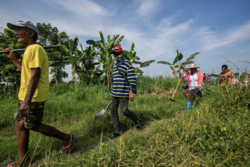The Manila Times | 2 September 2023
Kalap's 'agribusiness ecosystem' is a system of dispossessing farmers and abusing agri-workers – UMA
THE Unyon ng mga Manggagawa sa Agrikultura (UMA) wishes to respond to the article "Creating a robust agribusiness ecosystem" published last August 24. It was bylined by former Agriculture secretary William Dar, but spoke on behalf of the private sector-led initiative Go Negosyo Kapatid Angat Lahat Agri Program (Kalap).
On the surface, its call to mobilize the private sector to boost Philippine agriculture by assisting smallholder farmers appears laudable. With the prices of basic food commodities skyrocketing — rice now fetches almost P60 per kilogram (kg), triple Ferdinand Marcos Jr.'s campaign promise of P20 — any support for Filipino food producers should be welcomed.
But if one reads between their lines, what Kalap has called for is not systematic assistance but systemic dispossession. The consolidation of smallholding farms as the article describes it, has long been taking place in advance of so-called economies of scale — but instead of benefiting farmers, this has so far benefited only land-grabbers.
Land grabbing vs land distribution
For decades, big landlords and corporations have been taking advantage of the loopholes of agrarian reform programs, including the Comprehensive Agrarian Reform Program (CARP) of 1988. A pro-land-grabber measure, CARP facilitates anti-farmer schemes like agribusiness venture arrangements (AVAs) that encourage corporations to legally seize land already distributed on paper.
AVAs are lopsided deals in which an agrarian reform beneficiary (ARB) surrenders control of their farmland to an agribusiness corporation like Del Monte or Lapanday. The corporation then dictates what gets planted, who buys it and for how much. This leaves the ARB with little more than a pittance for rent, slave wages should they become an agri-worker, and debt. Always, there is debt.
As of 2019, at least 1.2 million hectares have been trapped in such AVAs and consolidated into corporate plantations. These yield high-value crops (HVCs) demanded by the world market for profit, not food staples needed by local communities for nourishment, as well as incorrigible work conditions for dispossessed peasants abused on their own land.
Among the most common of these arrangements is the growership. Here, a corporation contracts an ARB to become a grower of a particular HVC, sell it exclusively to the corporation, purchase inputs like fertilizers and pesticides from the corporation or its sanctioned affiliate and shoulder all production costs themself. The ARB's agreement is always borne of coercion — by sheer poverty, brute force, or both.
By promoting AVAs via CARP, the state puts the ARB at the mercy of the corporation. The corporation determines the price at which it buys the grower's produce, even the price at which they buy inputs, but it does not spend a single peso toward its production. Should they need a loan, they loan from the corporation. To the grower, all the risk; to the corporation, all the profit.
A glimpse into how bad it gets: Sumifru buys Cavendish from their growers at P14.07 per kg, then sells it online in Japan at P114. Dole Philippines buys pineapple from its growers at P5 per kg, yet fetches an export price of P26.14 and gets sold in New Zealand for P193.7. Contractualization and union-busting are also prevalent in plantations, aggravating agri-workers' landlessness with precarity.
Expanding a system of dispossession
Former president Rodrigo Duterte aimed to add 1.6 million more hectares to the existing 1.2 million — in Palawan alone, he had earmarked 20,000 hectares for oil palm, a notoriously destructive cash crop — and with Marcos' agreement with Dole Philippines to increase its pineapple production, the sitting president seems bent on seeing his predecessor's plan through.
Economies of scale indeed — because that much terrain amounts to 20 percent of the country's total agricultural lands. And peddled by no less than the Philippine government itself through a sham agrarian reform program, leaving it in the hands of big business. With all due respect to the former Agriculture secretary, is he not ashamed of being a sell-out?
If the current regime were serious about giving agriculture the boost it needs, it would consider the growing demand for a better agrarian reform policy — one that distributes land to the tillers at no cost to them; supports the production of food staples with subsidies, irrigation and other services; and respects their freedom of association in order to advance their interests.
Such a policy would also promote the formation of cooperatives, but not in the way Kalap envisions it. Cooperatives should facilitate collective farming for the gain of farmers, not corporations that profit off them, and put economies of scale at the service of food sovereignty rather than imperialist plunder.
Most importantly, it would honor and protect the peasants who have for decades been struggling to reverse the injustice of land monopoly begun by colonialism and perpetuated by imperialism. As the democratic majority of the population, farmers and agri-workers have the right to decide whose benefit Philippine lands must be used for, not big business, but the greater good.
Left in the hands of land-grabbers, no robust agribusiness ecosystem is possible. But a thriving peasant movement that's free to organize, articulate its demands and grievances, propose solutions to problems and assert control of land — that will certainly yield a robust agriculture. One that addresses the country's hunger and paves the way for national industrialization.
Ariel 'Ka Ayik' Casilao
Acting Chairman
Unyon ng mga Manggagawa sa Agrikultura (UMA)














